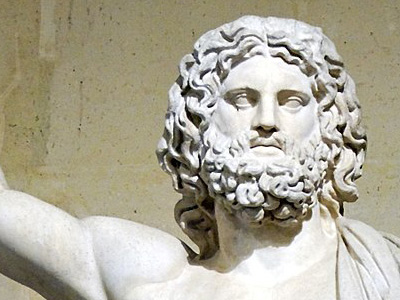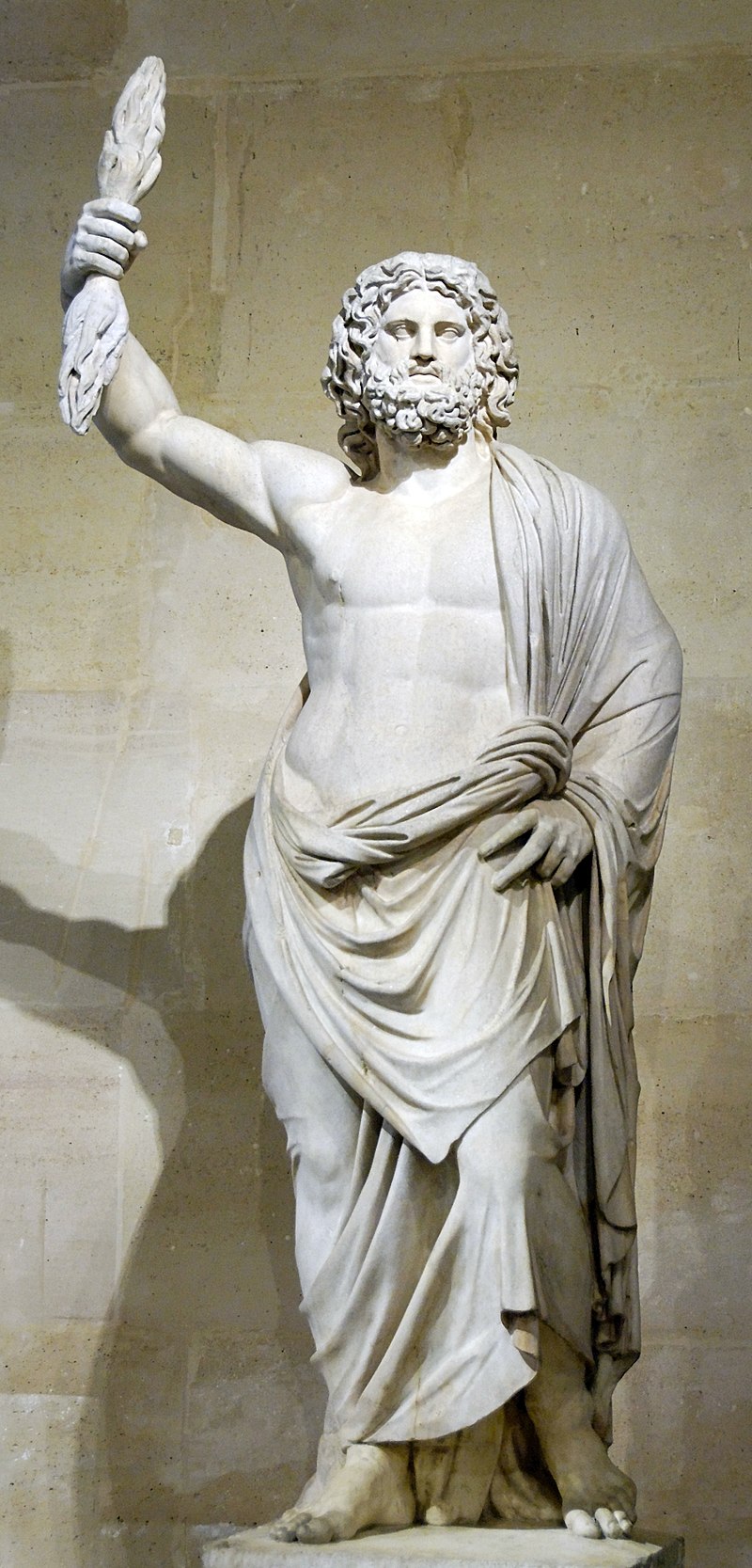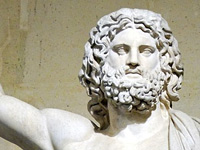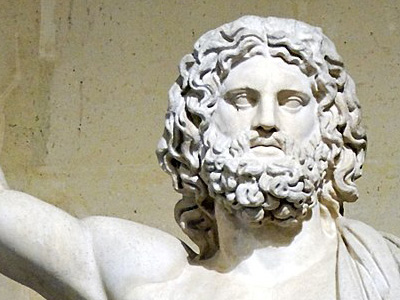Zeus

Zeus (/ˈzjuːs/; Greek: Ζεύς Zeús [zdeǔ̯s]) is the sky and thunder god in ancient Greek religion, who ruled as king of the gods of Mount Olympus. His name is cognate with the first element of his Roman equivalent Jupiter. His mythologies and powers are similar, though not identical, to those of Indo-European deities such as Indra, Jupiter, Perun, Thor, and Odin.

Zeus is the child of Cronus and Rhea, the youngest of his siblings to be born, though sometimes reckoned the eldest as the others required disgorging from Cronus's stomach. In most traditions, he is married to Hera, by whom he is usually said to have fathered Ares, Hebe, and Hephaestus. At the oracle of Dodona, his consort was said to be Dione, by whom the Iliad states that he fathered Aphrodite. Zeus was also infamous for his erotic escapades. These resulted in many godly and heroic offspring, including Athena, Apollo, Artemis, Hermes, Persephone, Dionysus, Perseus, Heracles, Helen of Troy, Minos, and the Muses.
He was respected as an all father who was chief of the gods and assigned the others to their roles: "Even the gods who are not his natural children address him as Father, and all the gods rise in his presence." He was equated with many foreign weather gods, permitting Pausanias to observe "That Zeus is king in heaven is a saying common to all men". Zeus' symbols are the thunderbolt, eagle, bull, and oak. In addition to his Indo-European inheritance, the classical "cloud-gatherer" (Greek: Νεφεληγερέτα, Nephelēgereta) also derives certain iconographic traits from the cultures of the ancient Near East, such as the scepter. Zeus is frequently depicted by Greek artists in one of two poses: standing, striding forward with a thunderbolt leveled in his raised right hand, or seated in majesty.
Birth
Cronus sired several children by Rhea: Hestia, Demeter, Hera, Hades, and Poseidon, but swallowed them all as soon as they were born, since he had learned from Gaia and Uranus that he was destined to be overthrown by his son as he had previously overthrown Uranus, his own father, an oracle that Rhea heard and wished to avert.
When Zeus was about to be born, Rhea sought Gaia to devise a plan to save him, so that Cronus would get his retribution for his acts against Uranus and his own children. Rhea gave birth to Zeus in Crete, handing Cronus a rock wrapped in swaddling clothes, which he promptly swallowed.
King of the gods
After reaching manhood, Zeus forced Cronus to disgorge first the stone (which was set down at Pytho under the glens of Parnassus to be a sign to mortal men, the Omphalos) then his siblings in reverse order of swallowing. In some versions, Metis gave Cronus an emetic to force him to disgorge the babies, or Zeus cut Cronus's stomach open. Then Zeus released the brothers of Cronus, the Hecatonchires and the Cyclopes, from their dungeon in Tartarus, killing their guard, Campe.
As a token of their appreciation, the Cyclopes gave him thunder and the thunderbolt, or lightning, which had previously been hidden by Gaia. Together, Zeus, his brothers and sisters, Hecatonchires and Cyclopes overthrew Cronus and the other Titans, in the combat called the Titanomachy. The defeated Titans were then cast into a shadowy underworld region known as Tartarus. Atlas, one of the titans who fought against Zeus, was punished by having to hold up the sky.
After the battle with the Titans, Zeus shared the world with his elder brothers, Poseidon and Hades, by drawing lots: Zeus got the sky and air, Poseidon the waters, and Hades the world of the dead (the underworld). The ancient Earth, Gaia, could not be claimed; she was left to all three, each according to their capabilities, which explains why Poseidon was the "earth-shaker" (the god of earthquakes) and Hades claimed the humans who died.
Gaia resented the way Zeus had treated the Titans, because they were her children. Soon after taking the throne as king of the gods, Zeus had to fight some of Gaia's other children, the monsters Typhon and Echidna. He vanquished Typhon and trapped him under Mount Etna, but left Echidna and her children alive.
LEGENDS

RESOURCES
This article uses material from the Wikipedia article "Zeus", which is released under the Creative Commons Attribution-Share-Alike License 3.0.
© Stories Preschool. All Rights Reserved.









